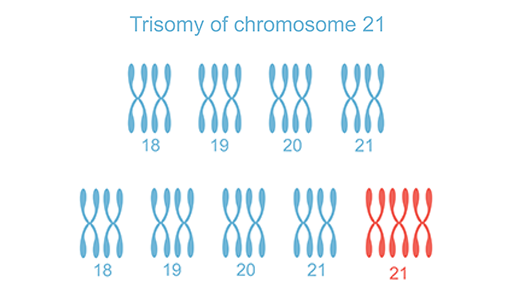

Non-Invasive Prenatal Testing (NIPT) analyzes cell-free fetal and maternal DNA from a blood sample to screen for common chromosome conditions including trisomy 13, 18 and 21.

Non-Invasive Prenatal Testing (NIPT) is a tremendous advancement in prenatal care that allows our Genetics Lab to screen chromosomes 13, 18, 21, X and Y at 10 weeks of pregnancy. NIPT detects the most frequent form of Trisomy 13 (Patau syndrome), 18 (Edwards syndrome), and 21 (Down syndrome) and identifies the gender of the baby through a non-invasive blood test. The validity of this test and its result has been tested clinically by multiple major health organizations, all coming to the consensus that NIPT is a major leap forward in detecting Down syndrome non-invasively.
Women who are pregnant with twins may complete NIPT at 12 weeks of pregnancy, however the gender of the babies cannot be determined.
It is important to note that while NIPT is accepted as an advanced non-invasive method with high screening validity, it should be used in conjunction with the available Antenatal Screening and Evaluation Tests mentioned below.
Carrying out NIPT is recommended to all high-risk pregnant women who exhibit one of the following indicators:
NIPT may be optional for low-risk pregnant women and should be discussed with your physician. You will consult in detail with your physician about your personal risk of carrying a child with trisomy 21.
The NIPT test centers on the analysis of cell-free DNA (cfDNA) in the pregnant woman’s blood. These small fragments of genetic material are not contained within cells, but circulate freely in the mother’s bloodstream and contain maternal DNA as well as between 2-40% (on average about 10%) fetal genetic material. The NIPT determines whether the pregnant woman’s blood contains elevated levels of fetal genetic material for a particular chromosome, indicating a corresponding trisomy in the unborn child.
Previously, readily available non-invasive Antenatal screening tests of Down syndrome included the first trimester blood test, second trimester blood test and the nuchal translucency ultrasound. These screening tests provide you with a risk assessment of Down syndrome and trisomy 13 and 18.
To diagnose Trisomy 13, 18 and 21 (Down syndrome) definitely, an invasive test, such as Amniocentesis, must be completed. Amniocentesis involves puncturing the amniotic membrane to collect cells, called amniocytes, from the amniotic fluid so that genetic testing can take place.

The genetic material of all cells is organized in chromosomes. During development, the chromosomes double before each cell division and then distribute evenly to two daughter cells, in a process called Meiosis. If the chromosomes do not distribute evenly, the child will carry abnormal genetic material. Oftentimes, this misdistribution of chromosomes prevents the development of a pregnancy and causes miscarriage. The most frequent and best known misdistribution of chromosomes is trisomy 21, in which chromosome 21 is present three times instead of twice in the child. Trisomy 21 is typical of Down syndrome.
If you are interested in learning more about NIPT, book an appointment today.